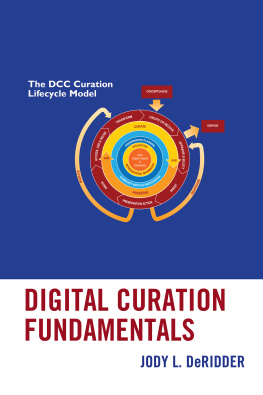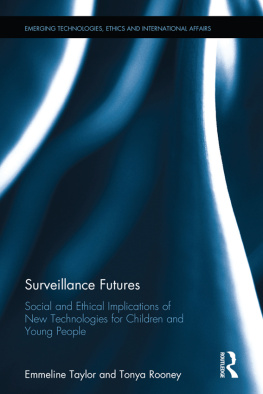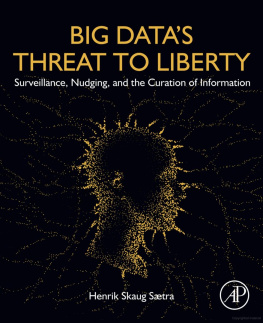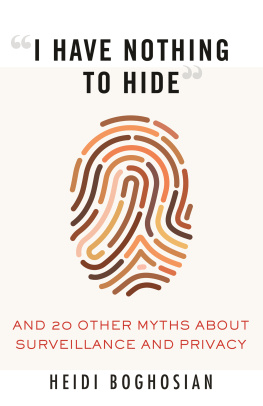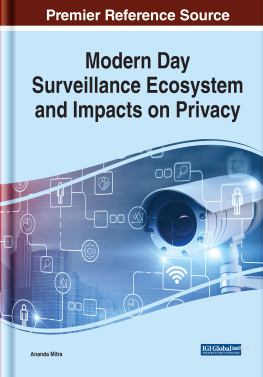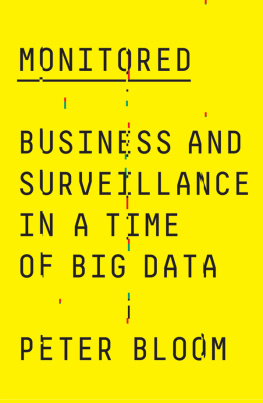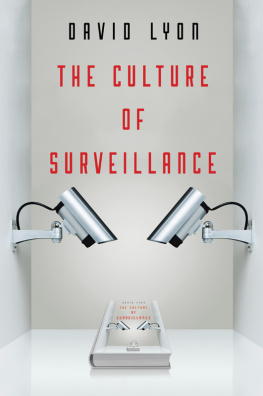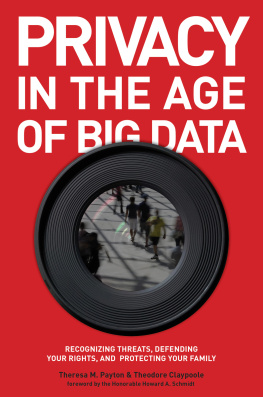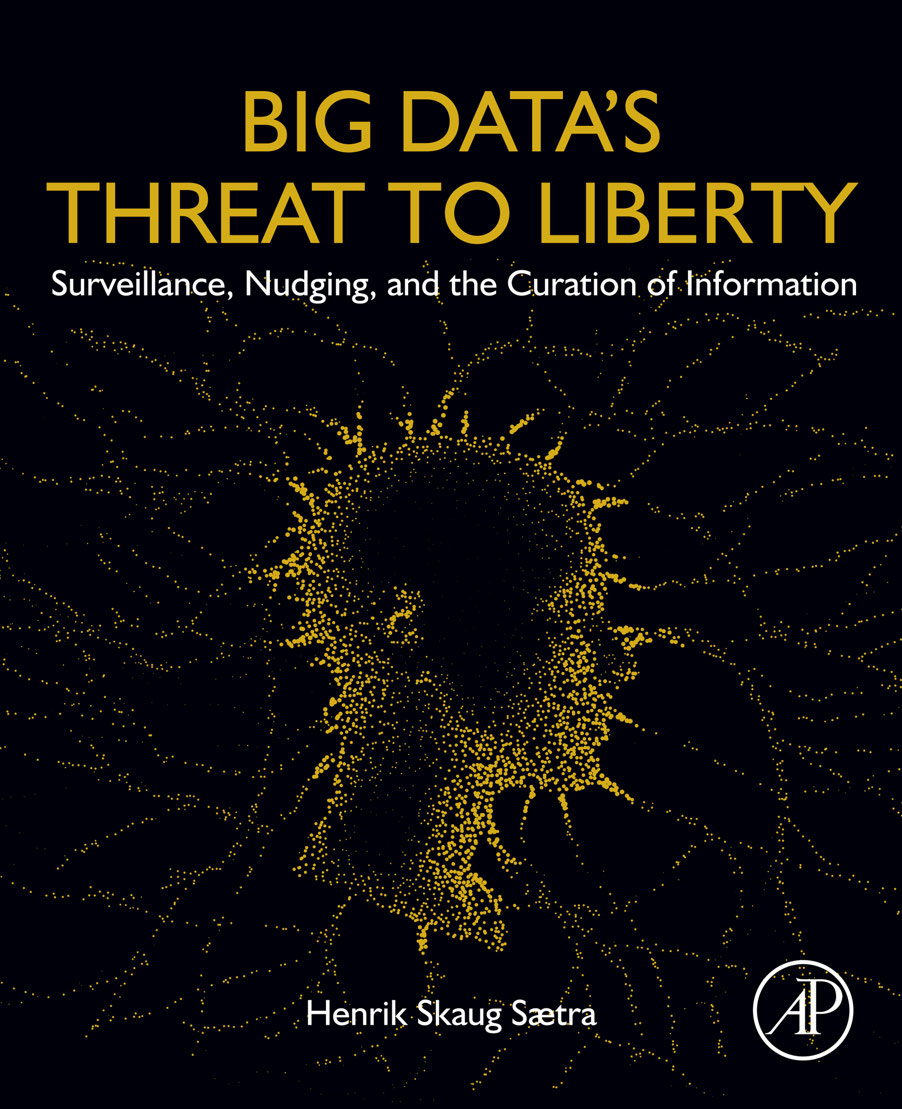
Big Datas Threat to Liberty
Surveillance, Nudging, and the Curation of Information
HENRIK SKAUG STRA
Faculty of Computer Sciences, Engineering and Economics, stfold University College, Halden, stfold, Norway

UNTITLED
Copyright
Academic Press is an imprint of Elsevier
125 London Wall, London EC2Y 5AS, United Kingdom
525 B Street, Suite 1650, San Diego, CA 92101, United States
50 Hampshire Street, 5th Floor, Cambridge, MA 02139, United States
The Boulevard, Langford Lane, Kidlington, Oxford OX5 1GB, United Kingdom
Copyright 2021 Elsevier Inc. All rights reserved.
No part of this publication may be reproduced or transmitted in any form or by any means, electronic or mechanical, including photocopying, recording, or any information storage and retrieval system, without permission in writing from the publisher. Details on how to seek permission, further information about the Publishers permissions policies and our arrangements with organizations such as the Copyright Clearance Center and the Copyright Licensing Agency, can be found at our website: www.elsevier.com/permissions .
This book and the individual contributions contained in it are protected under copyright by the Publisher (other than as may be noted herein).
Notices
Knowledge and best practice in this field are constantly changing. As new research and experience broaden our understanding, changes in research methods, professional practices, or medical treatment may become necessary.
Practitioners and researchers must always rely on their own experience and knowledge in evaluating and using any information, methods, compounds, or experiments described herein. In using such information or methods they should be mindful of their own safety and the safety of others, including parties for whom they have a professional responsibility.
To the fullest extent of the law, neither the Publisher nor the authors, contributors, or editors, assume any liability for any injury and/or damage to persons or property as a matter of products liability, negligence or otherwise, or from any use or operation of any methods, products, instructions, or ideas contained in the material herein.
Library of Congress Cataloging-in-Publication Data
A catalog record for this book is available from the Library of Congress
British Library Cataloguing-in-Publication Data
A catalogue record for this book is available from the British Library
ISBN: 978-0-12-823806-6
For information on all Academic Press publications visit our website at https://www.elsevier.com/books-and-journals
Publisher: Mara Conner
Acquisitions Editor: Chris Katsaropoulos
Editorial Project Manager: Rafael G. Trombaco
Production Project Manager: Omer Mukthar
Cover Designer: Miles Hitchen
Typeset by TNQ Technologies

Foreword
A few months ago, I purchased an Amazon Echo. If you are not familiar with it, the Echo is a smart speaker with an integrated cloud-based AI program called Alexa. The device now sits on my kitchen counter, silently blinking in blue, waiting patiently for my commands. Alexa, whats the weather like today?, Alexa, give me my news update, please!, Alexa, remind me to call my mother at 3pm!.
This was not an impulse buy; I purchased it for a reason. Like Henrik Skaug Stra, I am a philosopher and ethicist of technology. My general feeling is that if I am going to write about technology, it is incumbent on me to actually use it and be familiar with its features. But, given my day job, I am aware of the risks that such devices pose. They are, after all, surveillance machines. You welcome them into your home and then they track your voice commands, learn your preferences, and feed Amazons databases with information they can use to hone their products and services. That said, Alexa has a number of conveniences that I like. It is great for setting reminders and keeping track of your calendar. Its AI is also reasonably impressive, capable of answering factual questions and performing complex calculations. My inner child rejoices every time I ask it to do something. I feel as if I have stepped onto a science fiction movie set, speaking to a computer as if it were a normal and mundane part of my life (which, in a sense, it now is).
Recently, however, I have noticed a change in my behavior around Alexa. I am always conscious that it might be listening. I tell my wife to watch what she says in its vicinity. Although Alexa is only supposed to pay attention when you use its wake word (Alexa in this instance), a quick review of the voice history suggests that it can make mistakes. It sometimes listens and records information before deleting it as irrelevant. I still like the movie and book recommendations that Alexa gives me, but, despite the inconveniences this causes, I now tend to switch it off whenever I am not actively using it.
Heres the question: Does a technology like Alexa undermine my liberty? In a sense, it feels like it does. If I invited another person into my home, to observe my every move, I would undoubtedly act differently as a result. I would be more guarded in what I say; more cautious in what I do. I would start putting on a show rather than being my true self. That sounds like the opposite of being free. On the other hand, Alexa does allow me to outsource some of my cognitive burden. I do not have to keep track of dates and appointments anymore. Alexa will remind me of these when needed. This frees me up to think about other things that are more important to me. Similarly, Alexa gives me more choices than I had before when it comes to music, radio, and other forms of information. More choices and more time sound like a good thing when it comes to protecting liberty. It seems like there are arguments to be made on both sides. The technology both undermines and promotes my liberty.
Or does it? If you, like me, are confused about this issue, then you will be glad that you picked up this book. In Big Datas Threat to Liberty , Henrik Skaug Stra expertly guides the reader through the thicket of concepts and issues that lie at the heart of my confusion about Alexa. Liberty, it turns out, is a complex idea. People often claim that technology undermines or promotes liberty, but they often do not clarify what they mean by this. It is assumed that we know what liberty is. But liberty has many faces. There is negative liberty (freedom from interference and domination) and positive liberty (the power to be who you want to be). There are also perfectionist and non-perfectionist forms of both, as well as legitimate and illegitimate forms of interference with liberty. How are we to make sense of this complexity?
Stra has the answers. In a crystal clear exposition of big data and the threat to liberty, Stra encourages us to avoid the danger of talking past each other. He clarifies what is meant by liberty and what is meant by big data and then, in a series of rigorously formulated propositions and arguments, he identifies three core threats that big data poses to liberty: the surveillance threat, the nudging/shoving threat, and the information curation threat. Building on this, he then explains how these threats are linked to power relations in society and why it is important for us to care about them.
The book he has produced speaks for itself. I cannot do a better job summarizing its key claims than he has already done (indeed, one of the virtues of the book is its regular summaries of key arguments). I would, however, like to comment on two features of the text that I think are worth highlighting at the outset.



